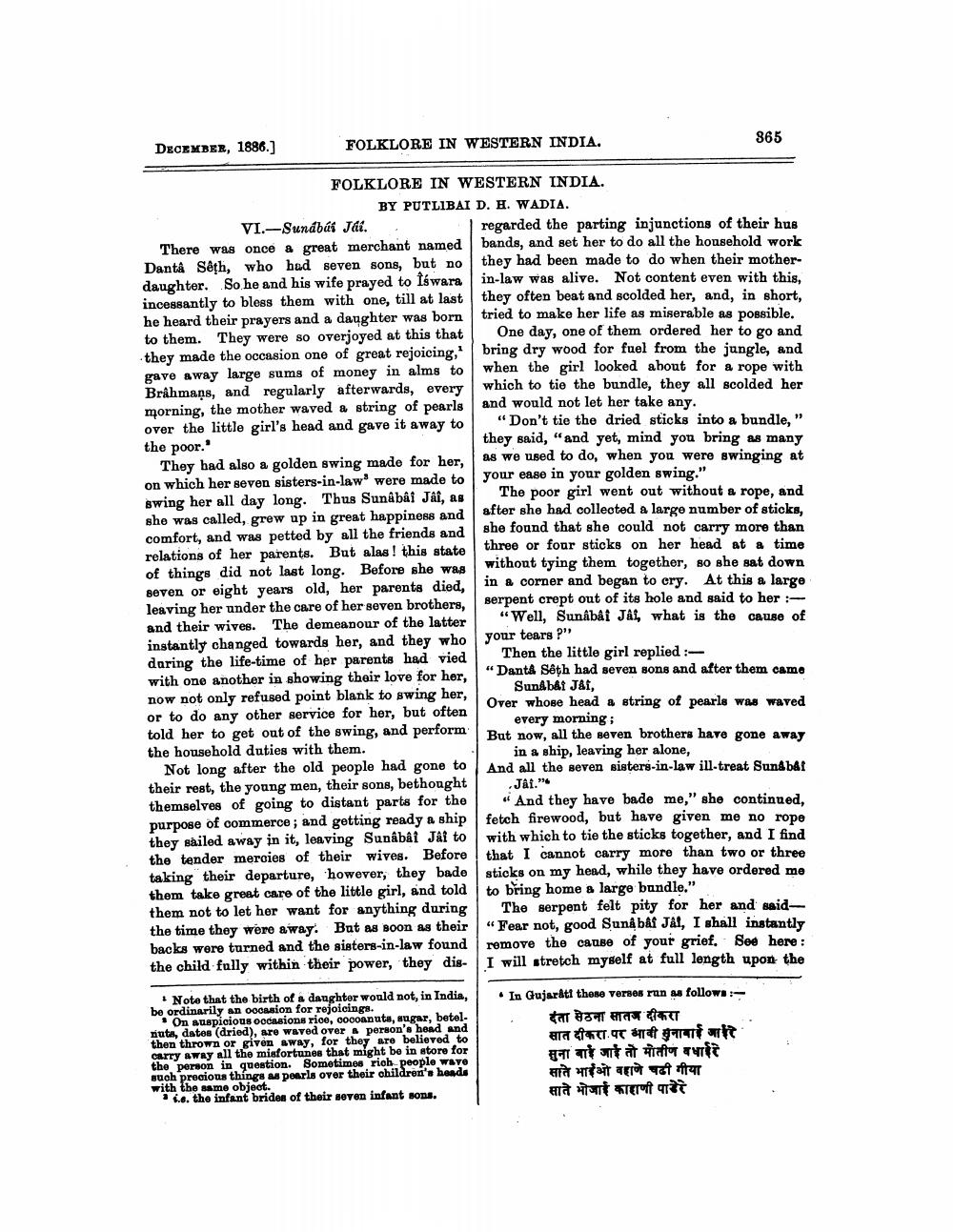________________
DECEMBER, 1886.)
FOLKLORE IN WESTERN INDIA.
365
FOLKLORE IN WESTERN INDIA.
BY PUTLIBAI D. H. WADIA. VI.-Sundbús Jai. .
regarded the parting injunctions of their hus There was once a great merchant named bands, and set her to do all the household work Dantâ Séth, who hud seven sons, but no they had been made to do when their mother
So he and his wife prayed to Iswara in-law was alive. Not content even with this, incessantly to bless them with one, till at last they often beat and scolded her, and, in short, he heard their prayers and a daughter was born tried to make her life as miserable as possible. to them. They were so overjoyed at this that One day, one of them ordered her to go and they made the occasion one of great rejoicing, bring dry wood for fuel from the jungle, and gave away large sums of money in alms to when the girl looked about for a rope wi Brahmans, and regularly afterwards, every which to tie the bundle, they all scolded her
orning the mother waved a string of pearls and would not let her take any. over the little girl's head and gave it away to
"Don't tie the dried sticks into a bundle," the poor.'
they said, "and yet, mind you bring as many They had also a golden swing made for her,
as we used to do, when you were swinging at on which her seven sisters-in-law were made to
your ease in your golden swing." swing her all day long. Thus Sunâbâi JAI, AS | The poor girl went out without a rope, and she was called, grew up in great happiness and
after she had collected a large number of sticks, comfort, and was petted by all the friends and
she found that she could not carry more than relations of her parents. But alas! this state
three or four sticks on her head at a time of things did not last long. Before she was
without tying them together, so she sat down Boven or eight years old, her parents died,
in a corner and began to cry. At this a large leaving her under the care of her seven brothers,
Berpent crept out of its hole and said to her :and their wives. The demeanour of the latter
"Well, Sunkbai Jai, what is the cause of instantly changed towards her, and they who your tears P" during the life-time of her parents had vied
Then the little girl replied :with one another in showing their love for her,
"Danta Sêth had seven sons and after them camo
Sunábat Ját, now not only refused point blank to swing her,
Over whose head a string of pearls was waved or to do any other service for her, but often
every morning; told her to get out of the swing, and perior B ut now, all the seven brothers have gone away the household duties with them.
in a ship, leaving her alone, Not long after the old people had gone to And all the seven sisters-in-law ill-treat Sundbaf their rest, the young men, their sons, bethought
Ját." themselves of going to distant parts for the "And they have bade me," she continued. purpose of commerce; and getting ready a ship fetch firewood, but have given me no rope they sailed away in it, leaving Sunábat Jai to with which to tie the sticks together, and I find the tender mercies of their wives. Before that I cannot carry more than two or three taking their departure, however, they bade sticks on my head, while they have ordered me them take great care of the little girl, and told to bring home a large bandle." them not to let her want for anything during The serpent felt pity for her and said the time they were away. But as soon as their “Fear not, good Sundbåt Ját, I shall instantly backs were turned and the sisters-in-law found remove the cause of your grief. See here: the child fully within their power, they dis- I will stretch myself at full length upon the
Note that the birth of a daughter would not, in India, be ordinarily an occasion for rejoicings.
On auspicious occasions rice, coconuta, sugar, betel. nuta, dstes (dried), are waved over a person's head and then thrown or kivon away. for they are believed to carry away all the misfortunes that might be in store for the person in question. Sometimes rioh people wayo such precious things ma pearls over their children's hands with the same object.
* 4.6. the infant brides of their seven infant sons.
In Gujarati these verses ran as follows:
दंता सेठना सातज दीकरा सात दीकरा पर भावी सुनावाई जार सुना बाईजाई तो मोतीण वधाईरे साते भाईभो वहाणे चढी गीया साते भोजाई काहाणी पाडेरे




